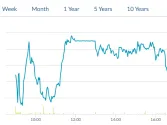
These are the top trends in hospitality this Q1 2025
Weekly sales have improved by 7%.
Weekly sales in the hospitality industry have increased by 7%, from $153k in Q1 2024 to $163K in Q1 2025, a report by Quantico revealed.
This suggests an improvement in revenue generation, potentially driven by increased customer visits, higher prices, enhanced marketing strategies, or expansion efforts.
Meanwhile, Food sales have increased from $38k in Q1 2024 to $39k in Q1 2025, reflecting a growth of 3%. This increase suggests that there may have been a slight uptick in customer demand for food offerings, which could be attributed to factors such as menu enhancements, promotional activities, or an increase in foot traffic.
Interestingly, Beverage sales have increased from $49k in Q1 2024 to $51k in Q1 2025, showing a 4% growth. Beverage sales this quarter trumped food sales indicating consumer preferences may have shifted.
This also suggests a positive trend in customer demand for beverages, which could be attributed to factors such as promotional campaigns, an expanded drink menu, or enhanced customer service that engages patrons more effectively. It’s also worth noting the bi-annual tax increase on alcohol took effect from the 5th August, which may also be influencing revenue.
Expenses
According to the report, the key expense metrics show varied trends from Q1 2024 to Q1 2025.
Overall, total utilities increased significantly by 17%, driven primarily by a 24% rise in electricity costs.
Cleaning expenses saw a modest increase of 2%. Insurance costs have risen by 4%, reflecting a common trend in the insurance industry. Security expenses also grew slightly by 2%.
Marketing expenses experienced a notable 44% increase, indicating a greater focus on attracting customers. Additionally, entertainment costs rose by 8%, suggesting investment in customer engagement strategies. Quantaco said these trends highlight the importance of effective cost management, especially in utilities and marketing, to maintain profitability amidst rising expenses.
The report is a review of the first financial quarter from July to September 2024, where key performance metrics were compared to the same quarter in 2023. This review is based on a broad range of industry participants.


























